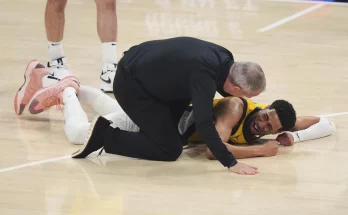Auburn football just landed a major win on the recruiting trail, and it’s one that could shape the future of their defense for years to come. Jaquez Wilkes, a consensus top-100 national recruit and highly coveted four-star linebacker out of the state of Florida, has committed to the Auburn Tigers. With this commitment, Wilkes turned down offers from college football juggernauts such as Florida State, Texas A\&M, Alabama, and Miami. In doing so, he made a powerful statement—not just about his belief in Auburn’s program, but about the changing landscape of SEC recruiting in the new era of college football. The Tigers, now under the guidance of a revitalized coaching staff, are once again drawing elite defensive talent capable of competing at the highest levels.
Wilkes is more than just another top recruit. He’s an elite linebacker prospect who checks nearly every box evaluators are looking for in a modern defensive force. At 6-foot-2, 220 pounds, he brings an explosive blend of sideline-to-sideline speed, downhill tackling ability, and coverage instincts that allow him to function like an extra defensive back when necessary. In a league where speed kills and defensive versatility is king, Wilkes offers both in abundance. Watching his film, it’s clear why so many blue bloods prioritized him as a top target. He possesses a rare closing burst and violent tackling form, but it’s his anticipation and read-react skills that truly separate him from others in his class. Wilkes is the kind of player who doesn’t just follow the ball—he seems to know where it’s going before the offense even fully commits.
The competition for Wilkes was fierce. Florida State had him on campus multiple times and was widely considered a frontrunner for much of the cycle. The Seminoles’ tradition, coupled with their resurgence under Mike Norvell, made them a legitimate threat. Alabama’s pursuit was no less intense. The Crimson Tide, renowned for churning out NFL-caliber linebackers every year, made a late push. Texas A\&M, flush with NIL resources and talented young defenders, tried to sell Wilkes on being the final piece of their evolving defense. Even Miami—emerging as a local powerhouse again under Mario Cristobal—offered the appeal of staying close to home while rebuilding a once-proud brand.
Yet it was Auburn that won the day, and that says something deeply significant about the current momentum building on The Plains. The Tigers didn’t just beat other top programs for a highly-rated linebacker—they beat their in-conference rivals and direct recruiting foes. This commitment signals that Auburn is no longer being left behind in the SEC arms race. Rather, they are fighting—and winning—for the kind of blue-chip talent that championship teams are built around. For the coaching staff, especially the defensive brain trust, Wilkes’s decision is a resounding endorsement of their vision for the future.
Recruiting in the Southeastern Conference is a brutal and hypercompetitive arena, especially for defensive prospects. Programs across the region pride themselves on developing elite linebackers and fielding dominant front sevens. Georgia, Alabama, LSU, and now even emerging forces like Ole Miss and Arkansas have consistently stacked their rosters with top-tier defensive talent. To remain competitive in this environment, Auburn had to secure players like Wilkes. They needed someone who could eventually anchor the middle of their defense, call out assignments, diagnose complex offensive schemes, and most importantly—make plays that change games.
Wilkes, with his unique physical tools and high football IQ, projects to be that kind of leader. Not just a cog in the machine, but potentially the engine itself. He’s the kind of player who can command the huddle, elevate teammates, and set the tone on and off the field. His high school coaches rave about his commitment to film study, his willingness to stay after practice for extra work, and his ability to mentor younger players despite being one of the team’s top stars. Those intangibles—combined with his on-field dominance—make him a rare breed and an ideal cultural fit for a program like Auburn that values grit, leadership, and accountability.
From a schematic perspective, Wilkes fits perfectly into what Auburn is building defensively. The Tigers are shifting toward a system that emphasizes speed and versatility at the second level. Gone are the days of thumping, run-stopping linebackers who struggle in space. Today’s defenses must handle spread offenses, mobile quarterbacks, and tight ends who run like wide receivers. In that kind of environment, a linebacker who can blitz, cover, and tackle in space is a necessity, not a luxury. Wilkes’s ability to flip his hips, diagnose routes, and blanket running backs or slot receivers makes him an instant asset.
It’s not hard to imagine Wilkes contributing early in his career. While many freshmen linebackers need a year or two to adjust to the physicality and complexity of SEC football, Wilkes might be the exception. His build and athleticism already resemble that of a college junior. His football instincts are advanced. If he can pick up the playbook quickly and earn the trust of his coaches, there’s a real path to immediate playing time—especially on special teams and in rotational sub-packages. Long term, he’s a candidate to be the centerpiece of the defense.
The timing of this commitment is also important. It comes at a critical juncture in Auburn’s recruiting calendar, providing momentum heading into the fall. Big-time commitments often create a domino effect, particularly at programs where peer recruiting plays a major role. Wilkes isn’t just a great player—he’s also charismatic, well-connected, and respected by other top prospects. His decision could influence other high-profile recruits to take a closer look at Auburn, and he may even serve as an unofficial ambassador, helping build a class that reestablishes the Tigers as a recruiting power.
In the modern college football world, where NIL, transfer portals, and coaching turnover have added layers of complexity, securing a commitment like this is no small feat. It requires trust, vision, and relationships. Auburn’s staff clearly built a bond with Wilkes and his family that went beyond football. That speaks volumes about the program’s culture, and about its ability to connect with elite athletes not just on the field, but as people. In an age where authenticity matters more than ever to recruits, Auburn’s genuine pitch clearly resonated.
Jaquez Wilkes is more than just another name on a recruiting board. He’s a statement of intent. A declaration that Auburn is ready to return to national relevance, not just through slogans or social media buzz, but through the hard work of securing elite players who can win in the trenches. His decision reflects the belief that Auburn is building something real—something sustainable—something worth being a part of. And for Auburn fans, that should be a cause for excitement and pride.
What separates a good program from a great one often comes down to recruiting. Championships are won in January and February, long before games are played in the fall. When Auburn wins battles for prospects like Wilkes, they’re not just improving the roster—they’re changing the perception of what’s possible. They’re reminding the college football world that the Tigers are still a sleeping giant capable of roaring back into the national conversation. And if Wilkes develops as expected, he may one day be remembered as one of the cornerstones of that revival.
The future, of course, remains unwritten. Wilkes will need to continue developing, stay healthy, and adjust to the mental and physical challenges of SEC football. But there’s no denying the foundation is there. With the right coaching and support, he could become an All-SEC performer, a Butkus Award finalist, and a future NFL draft pick. His ceiling is that high, and his work ethic suggests he’ll do everything in his power to reach it.
For now, though, Auburn can simply celebrate a huge recruiting win. Jaquez Wilkes is a Tiger, and his decision represents more than just one player choosing a school. It’s a victory for a coaching staff that believed in him. It’s a testament to a program that refused to be outworked. It’s a symbol of hope for fans hungry to return to the top. And perhaps most importantly, it’s a glimpse into a future where Auburn football is once again defined by elite defense, relentless effort, and championship ambition.
War Eagle, indeed.



